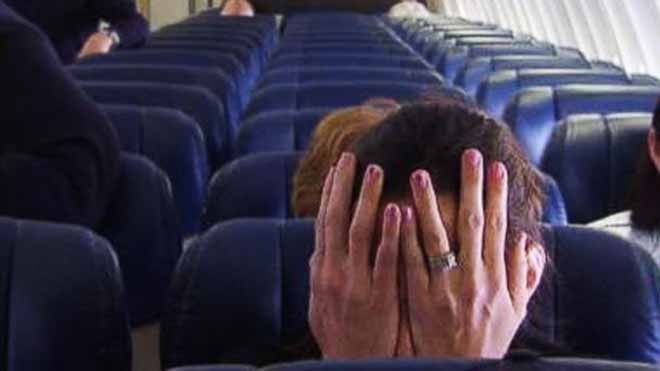
For all those out there who suffer from flying anxiety...

Flying jitters and a nervous anxiety prior to a flight. Surprisingly, this state is just as common as Monday blues but not perhaps as easy to deal with. This is especially the case when these jitters prevent a person from boarding a flight or instilling such a dread of the journey that the experience becomes a torturous one.
Referred to aerophobia, aviophobia or simply the fear of flying, it is a state which prevents an individual from undertaking a flight due to various reaons. Lack of control, claustrophobia, acrophobia (fear of heights) as well as agoraphobia (having a panic attack in a place from which there is no escape) are fears that may accompany aerophobia.
This phobia was considered a stranger to most people but it seems to lurk in many homes as an unwelcome guest.
Modern aviation disasters have not helped dispel this fear and neither has the present day threat of terrorism that follows us as a shadow wherever we are. This curse of the 21st century has made aerophobia worse. The ‘What If’ factor looms in our minds and hearts from the time we decide to fly and all the way through check in, security, boarding and the actual flight.
The worst manifestation of this was the misfortune of Sept 11, 2001. It brought to life the ultimate fear of the aviophobe -- it is very possible in today’s astute world of precision and perfection to fall into the hands of chance and bad luck.
The level of security checks at airports today does not pacify the person who fears flying; in fact, it reinforces his stance that something must be wrong .It is an area where no logic or reasoning works, because we have reason and evidence to think and imagine the worst.
Not being able to take a flight must have its own consequences. These range from missing important family occasions to more serious ones like rejecting better medical care for fear of travel and delaying or not undertaking business related travel. To travel is to grow and by not being able to use the swiftest and most reliable form of transportation the modern era has to offer, one is compromising one’s convenience, need, opportunities, growth and development. These are heavy prices to pay in today’s overly competitive world where my loss is your gain and each opportunity lost is someone else’s opportunity gained.
People who suffer from flying anxiety have attributed this state to lack of control, powerlessness and claustrophobia. Those who are actually able to board have feared terrorism attacks and engine failure. Light headedness, dizziness, difficulty in breathing, extreme palpitation, tingling in fingers and cold hands are some of the physical symptoms experienced once the flight has taken off.
Others not so brave have missed flights, holidays and business trips since they have not been able to take that final step of boarding an aircraft. It seems an almost incurable affliction to those who suffer from it. Potential passengers have sleepless days before travelling, nightmares about upcoming travel and are unable to get rid of negative thoughts about air travel. Antianxiety pills and sedatives before and during flight have helped but the anxiety returns once the effect is worn off.
One nervous passenger was able to overcome her fears by telling herself that death was predestined whether she air travelled or not. Overcoming her fears was, in a way, restoring her faith and she advises others to believe in the predestination of death also and not let fear come in the way of faith.
British Airways Flying With Confidence runs courses at various locations around the globe to help passengers overcome their fear of air travel. Divided into pilot and psychologist lessons, these courses help thousands overcome their fear of flying. The idea is to enlighten the passenger with sufficient knowledge about how an aircraft flies and operates. Air turbulence, flight safety etc. are areas covered in this session. The session deals with the psychological aspects of flying and how to deal with the anxiety surrounding flying. During the flight, a commentary is given explaining the various aspects of the flight. This stage has been particularly helpful in reassuring passengers and helping them overcome the fear of flying.
The Virgin Atlantic Flying Without Fear is another programme that helps thousands every year to overcome their fear of flying. With a success rate of 98 per cent and run by trained experts in the field of aviation and psychotherapy, it has helped men, women and children with fear ranging from mild anxiety to complete terror.
The right support in the form of support groups and self-help courses could go a long way in helping a person cope with his or her fear and overcome it in a way that makes air travel at least bearable if not pleasurable.
Let the fears fly away in the air. The clouds will not allow cell phones to beep and offer a physical detachment no other place can. Terrorism is just as likely to unleash itself on ground and road accidents take more lives than aviation disasters. So let go and enjoy. There is a very high probability of landing safely.